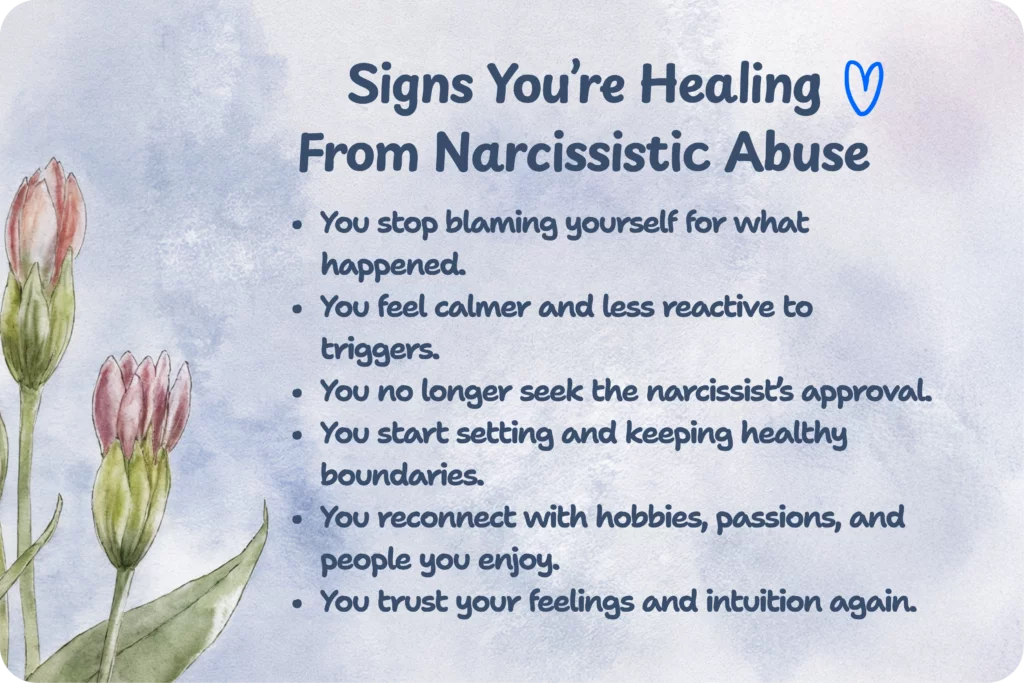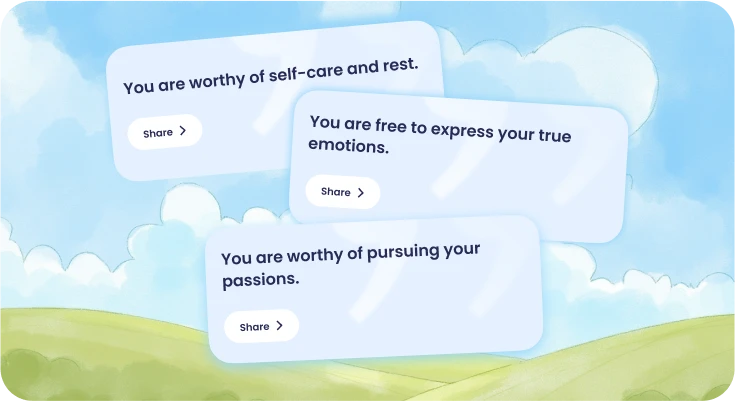Even when the abusive relationship ends, past trauma may remain, affecting emotional well-being and potentially compromising your sense of self. Persistent thoughts like “I’m not worthy of a normal relationship” or “No one will ever love me again” can become ingrained. Sometimes the healing process takes time and effort, as well as a support system and professional help.
Let’s find out the common stages of narcissistic abuse healing, long-term effects, and self-care strategies to begin healing.
What Is Narcissistic Abuse and Why Does Recovery Matter?
Narcissistic abuse is a form of emotional abuse used by people with narcissistic traits or narcissistic personality disorder (NPD) to maintain control, dominate, or exploit others. It can happen in romantic relationships, families with dysfunctional roles, friendships, or workplaces.
This type of abuse can develop gradually and invisibly and may include various behaviors like gaslighting, silent treatment, blame-shifting, conversational narcissism, emotional invalidation, and love-bombing, followed by devaluation. Eventually, these tactics can diminish a person’s confidence, sense of reality, and overall mental health.
According to research on intimate partner violence, long-term exposure to manipulation can rewire how your brain responds to stress and relationships. They are more likely to have depression, insomnia or sleep difficulties, posttraumatic stress disorder, and other anxiety disorders, and frequently attempt suicide [1].
Survivors of abuse in a narcissistic relationship may find themselves:
- Unsure of what’s real and what can be trusted
- Feeling perpetually anxious or falling into a shame spiral
- Losing trust in others and feeling like a failure
- Experiencing depression, hypervigilance, or emotional numbness
Wondering, “Why do I get attached so easily?” Take an attachment style test to figure it out!
Why Recovery Matters
Distressing consequences of narcissistic abuse may show up during a relationship with a narcissist and can persist long afterward. It may keep you trapped in patterns of fear and self-doubt. Recovery helps you:
- Process emotional baggage and rebuild healthy boundaries
- Trust your own emotions and perceptions again
- Learn how to love yourself and what safe, mutual relationships look like
- Reconnect with your authentic self
Expert Insight
Narcissistic abuse can deeply affect your sense of trust in yourself and others. You may be hypervigilant in everyday situations, constantly assessing for threat or harm. You might also struggle with low self-esteem. This is because constant belittling or gaslighting impacts how you perceive yourself. After all, it’s hard to build or maintain internal security when you are degraded.
Nicole Arzt
Mental health professional
3 Stages of Recovery from Narcissistic Abuse
Here are some stages to help you understand what’s happening and how you can take care of yourself:
Stage 1. Crisis
“I don’t know what to do with my life” is a common thought for people who have just broken free from the abusive behavior of a person with narcissistic tendencies. During this phase, you may experience strong fluctuations between anger, sadness, and denial. Obsessive thoughts may keep cycling, such as worrying about having made a mistake or feeling like something is wrong with you.
If you’ve just ended a romantic relationship with a narcissistic abuser, you may justify, minimize, and even deny abuse due to cognitive dissonance. It’s typical to feel unwilling to give up your initial belief that the narcissistic partner is a kind, loving, and caring person. It’s also common to stay optimistic about the potential for change and even romanticize the early stages of the relationship.
Physically, you may experience insomnia, loss of appetite or overeating, muscle tension, panic attacks, or psychosomatic symptoms [1].
Stage 2. Increasing awareness
Gradually, you begin to comprehend the scale of the traumatic events and manipulation you went through. Forgotten episodes of abuse may appear in your memory. Sometimes you may feel shame, thinking, “How could I tolerate this?” You may be able to occasionally ground yourself, but it’s normal to experience deep sadness, fatigue, anger, regret, and confusion.
Stage 3. Healing
You begin to feel stable and practice self-care. The memories about the abusive relationship no longer cause as much pain, but rather irritation or indifference.
This is how the Breeze app can come in handy during this stage:
- Self-discovery tests and quizzes may help you learn more about your personality, attachment style, and relationship patterns.
- Personalized routine plans to get motivated and maintain discipline.
- Breeze guided journaling for processing anger, sadness, and disappointment.
How Long Does It Take to Recover from Narcissistic Abuse?
Expert Insight
Healing from abuse is a complex, individual process without a defined timeline. Some days will feel harder than others, and it’s normal to experience moments of complete despair or feeling like things will never get better. Having support and cultivating self-compassion are among the most important variables for recovery.
Nicole Arzt
Mental health professional
7 Signs You’re Healing From Narcissistic Abuse
Here are some key signs you’re in the recovery process:
- You know how to feel your feelings and don’t doubt or minimize them.
- You set boundaries and no longer feel guilty for protecting your energy or saying “no”.
- You don’t try to win approval from those who hurt you. Their criticism or silence no longer dictates your mood or self-worth.
- Manipulations that once confused or hurt you now feel obvious. You can spot red flags like gaslighting, guilt-tripping, or love-bombing, and know how to detach from someone.
- You rediscover your interests, values, and identity that were suppressed by the narcissist’s control. You enjoy hobbies, passions, or spending time alone.
- You feel comfortable with peace and no longer confuse drama with love or excitement with validation.
- You believe in healthy love again and know the green flags in a relationship you should look for.

Trauma Responses After Narcissistic Abuse
People who have experienced narcissistic abuse may develop automatic emotional and physical reactions to stress or perceived danger, such as hypervigilance, anger, anxiety, or tension. These trauma responses are the mind and body’s way of trying to protect themselves after prolonged manipulation, gaslighting, and emotional instability:
1. Fight
Some survivors react with anger or rebellion when they sense control or criticism. They may become hypervigilant, argumentative, or defensive to stand up to their abuser.
2. Flight
Others try to avoid conflict, trying to stay busy, distract themselves, or withdraw emotionally to escape feelings of shame. They may be overworking, struggle with perfectionism, or have a fear of being hurt again.
3. Freeze
In this case, survivors may feel insecure when making decisions or be unable to leave toxic relationships even when they want to.
4. Hypervigilance
After relationships with a narcissistic abuser, a person may live in a state of constant anxiety. They may be waiting for the next anger outburst or manipulation, worrying about everything, which makes it hard to relax or trust others.
5. Loss of Sense of Self
Gaslighting and emotional control can leave survivors unsure of who they are or what they want. They may feel empty and second-guess their feelings, preferences, and values.
6. Fawn
Also common among children of narcissistic parents, the fawn response means trying to please others to stay safe. Survivors may over-apologize, fear saying “no”, or put everyone’s needs before their own, expressing people-pleasing tendencies.
Wondering, “Why do I attract narcissists?” It’s possible you had a narcissistic mother or abusive dad who influenced your mental health and relationship patterns. Take a test to find out!
5 Practical Strategies to Heal From Narcissistic Abuse
Being in a narcissistic relationship, you may live in a constant state of anticipation with a heightened sense of anxiety. You may be waiting for your abusive partner to change, holding onto moments of kindness to soothe over the cruelty. You might also be waiting for the “perfect” moment to end the relationship.
Here are the main steps to heal your mental health after such emotional abuse:
1. Have no contact with the narcissistic abuser
After you broke up with someone who abused you, try to block all contact, such as social media, phone, email, etc.:
- It’s better not to read or respond to messages that reach you, or follow this person on social media.
- Tell your friends and family members that you do not want to know or talk about this person.
- Try not to respond to gossip or slander that the abuser may spread about you.
2. Create a self-care routine
According to the National Domestic Violence Hotline, self-care can improve your self-perception and help you recover from the abuse [2]. Self-care activities can include:
- Eating regularly, getting enough sleep, and exercising may help you get out of your head.
- Mindfulness activities like breathing, grounding techniques, and meditation.
- A creative hobby to calm down and live in the moment.
- Daily positive affirmations in the Breeze app to stop negative self‑talk, improve your self-esteem, and become the best version of yourself.

3. Reflect through journaling
When you catch yourself ruminating over the narcissist’s words or actions, journal your thoughts. You can write down key events of those abusive relationships and what you felt then and now. Documenting your reality may help reinforce your perception of truth and overcome self-doubts that result from gaslighting.
Generally, journaling may help you look at the situation from a distance, gain perspective on triggering situations, and break free from emotional dependency. Research on writing about a difficult life experience shows that it can reduce stress, symptoms of anxiety and depression, and boost overall well-being [3].
Science-backed, compassionate prompts in the Breeze guided journaling allow you to process your grief and understand how to change your life.

4. Reinvent yourself
Visualizing a life free from abuse can inspire hope and motivate you to keep moving forward. Set small, achievable goals that align with your passions and values. In the book, “Narcissistic Abuse Recovery & Self‑Rediscovery,” trauma survivor Luna Merrick offers the following practice:
- Write down your “pre‑abuse self” and compare it with your “post‑abuse self” to identify what part of you was lost or overshadowed.
- Create a list of your core values, interests, and strengths. Discover different facets and aspects of your personality. This will help you strengthen your connection with yourself and trust yourself more. Then design daily or weekly actions aligned with those values to step into your authentic self again.
5. Educate yourself about narcissistic abuse
Learning more about narcissistic traits and types of narcissism can help you better understand your feelings and how to deal with a narcissist. According to research on survivors of intimate partner violence, studying may connect you to other survivors who have had similar experiences with narcissistic abuse and can become part of your support system [4]. This experience can be validating and help you find closure.
When and How to Seek Therapy for Narcissistic Abuse
You don’t have to wait until you feel completely lost in life. Therapy can be valuable at any stage of recovery. But it’s especially important to reach out if you notice:
- You feel guilty, anxious, or depressed
- You have difficulties trusting others or a fear of intimacy
- You feel worthless and stuck, unable to move on or make decisions
- You experience flashbacks, nightmares, or panic attacks
These are signs that trauma may still be affecting your nervous system and sense of safety. Finding a good therapist can help you understand these reactions and show you that healing is possible. The following are some types of therapy that could help in your recovery from narcissistic abuse:
- Cognitive Behavioral Therapy (CBT): Helps change negative thought patterns and rebuild self-worth.
- Eye Movement Desensitization and Reprocessing (EMDR): Helps process traumatic memories safely.
- Somatic Therapy: Focuses on how trauma lives in the body, helping you release tension and reconnect with your physical self.
- Group or Support Therapy: Offers validation and connection with support groups that understand you.
Frequently asked questions
1. Can narcissistic abuse cause PTSD?
Yes, narcissistic abuse can cause symptoms similar to post-traumatic stress disorder (PTSD) or complex PTSD (C-PTSD). Victims may experience trauma symptoms, including flashbacks, hypervigilance, emotional numbness, anxiety, or difficulty trusting others. This can happen because long-term manipulation and difficult emotions keep the nervous system in a constant state of stress.
2. How do you know you're healing from narcissistic abuse?
Healing is fluid without a fixed destination. That said, you are in a state of healing when you can:
- Stop blaming yourself for the abuse
- Feel calmer and less reactive to triggers
- Start setting healthy boundaries without guilt
- Reconnect with your interests and goals
- Feel more confident in trusting your instincts again
3. Can you fully recover from narcissistic abuse?
Yes, narcissistic abuse recovery is absolutely possible. With therapy, self-compassion, and consistent self-care practices, many survivors rebuild their self-esteem and create healthy relationships with themselves and others.
Sources
1. Natalia Bueso-Izquierdo, Mónica Guerrero-Molina, Juan Verdejo-Román, Juan Manuel Moreno-Manso. The three faces of intimate partner violence against women seen from the neuroimaging studies: A literature review. January–February 2022
2. National Domestic Violence Hotline. 5 Powerful Self-Care Tips for Abuse and Trauma Survivors.
3. Stapleton CM, Zhang H, Berman JS. The Event-Specific Benefits of Writing About a Difficult Life Experience. February 2021
4. Flasch, P., Fall, K., Stice, B., Easley, R., Murray, C., & Crowe, A. Messages to new survivors by longer-term survivors of intimate partner violence. January 2020
Disclaimer
This article is for general informative and self-discovery purposes only. It should not replace expert guidance from professionals.
Any action you take in response to the information in this article, whether directly or indirectly, is solely your responsibility and is done at your own risk. Breeze content team and its mental health experts disclaim any liability, loss, or risk, personal, professional, or otherwise, which may result from the use and/or application of any content.
Always consult your doctor or other certified health practitioner with any medical questions or concerns
Breeze articles exclusively cite trusted sources, such as academic research institutions and medical associations, including research and studies from PubMed, ResearchGate, or similar databases. Examine our subject-matter editors and editorial process to see how we verify facts and maintain the accuracy, reliability, and trustworthiness of our material.
Was this article helpful?







